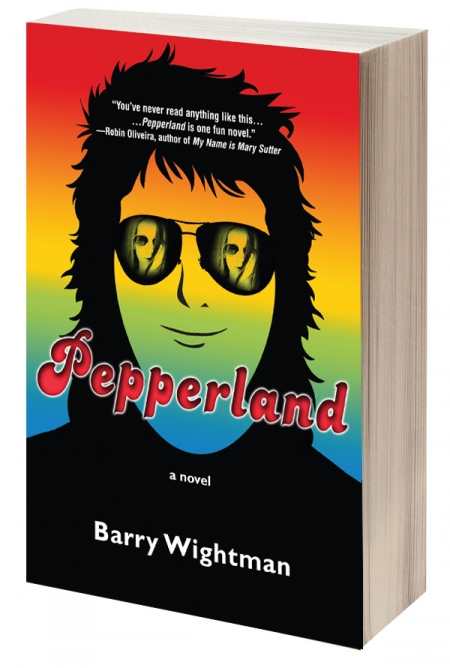Pepperland
Obvious love for music, technology, and the written word exudes from each page.
With an effervescent momentum, Barry Wightman’s novel Pepperland explores a crossroads where music, technology, and love intersect. It’s the mid-1970s in Chicago, and rock star-hopeful Pepper Porter is searching for it—that intangible, inexplicable, but oh-so-exhilarating internal harmony that occurs when “everything lines up like polarized ions.” Along the way, he finds himself smack dab in the middle of revolutions both personal and public.
Pepper’s dreams of making it big as a musician are, maybe most surprisingly to himself, becoming a reality. Yearning for authenticity but also for stardom, Pepper must learn to navigate the music industry with his Pepperland band mates, Checkers Records executive Harrison Creach, and a Dark Stranger who may or may not be his dead little brother.
But then there is Sooz—tech goddess, camp counselor, on-the-lam former member of the Weather Underground, and Pepper’s long-lost love. She wants to change the world. Soon Pepper finds himself digging back into his former life as a would-be IBM suit to help Sooz with her latest attempt at revolution: cutting-edge communications technology that would connect people throughout the world.
Wightman’s enthusiasm here is contagious. An obvious love for music, technology, and the written word exudes from each page. The plot is easily carried by finely tuned pacing that allows Wightman’s craft to shine. Unique features of the text—footnotes, chapters referred to as “sides,” and transcripts of interviews Pepper has with himself—enhance readers’ experience of the narrative.
There is mystery and magic in Pepperland as well, especially in the relationship between Pepper and his brother/band mate/roommate, Dave, and the memories they share of their brother, Elliot, who died as a young child. Wightman deftly explores loss as the now-grown brothers marvel at the presence of the Dark Stranger, whose sudden appearance coincides with their seemingly increasing musical talent and rising public success.
Characters are well developed and almost entirely likable. Readers will enjoy the just-snarky-enough accordion-playing band mate, Hawgrim, whose money-loving insurance-salesman alter ego provides a satisfying foil to Pepper’s more esoteric, searching-for-it rocker hero. Band manager, Creach, is the fatherly, afro-sporting wise sage readers want him to be. Even cameos by Hugh Hefner hit the right note.
Descriptions that showcase Wightman’s obvious talent for capturing the minute create hyper-detailed images of places and spaces that scream 1970s America: the Playboy Club, Chicago’s Palmer House Hotel, a home office where the computer equipment takes up more space than the furniture. Some passages, however—particularly those that delve deeply into musical reverie or tech talk—overwhelm in their verbosity and use of jargon, though the author’s passion for and knowledge of his subject matter is never in question.
Readers may be a little disappointed by Pepper’s choice at the end of the novel, in part because it seems like such a final, all-or-nothing decision. But for Pepper—and for Wightman—love just might be it.
Reviewed by
Margaret Fedder
Disclosure: This article is not an endorsement, but a review. The publisher of this book provided free copies of the book and paid a small fee to have their book reviewed by a professional reviewer. Foreword Reviews and Clarion Reviews make no guarantee that the publisher will receive a positive review. Foreword Magazine, Inc. is disclosing this in accordance with the Federal Trade Commission’s 16 CFR, Part 255.

